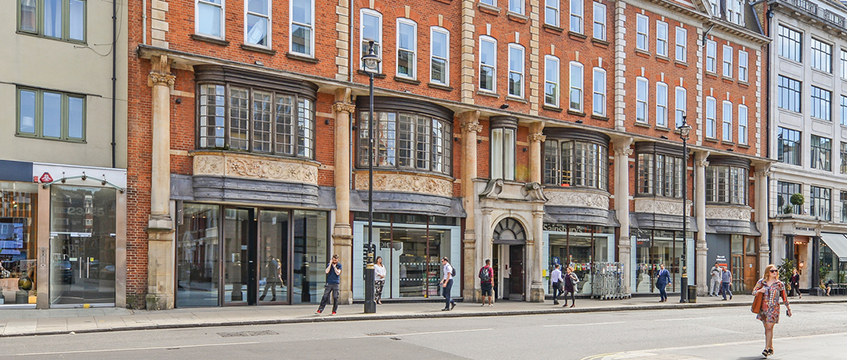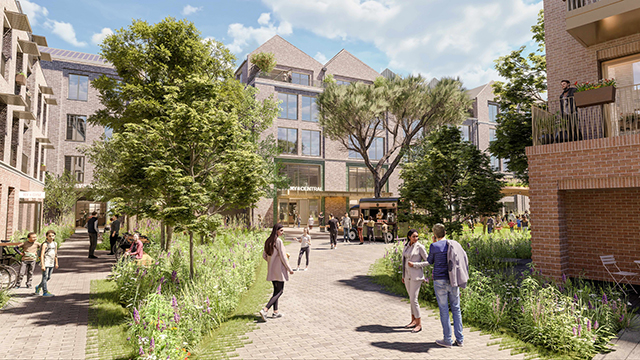When it comes to combating climate change, the battle cannot be fought by landlords alone. Occupiers have a role to play too. Only through collaboration can a real change be made.
To try to find a way to blur the line between landlord and tenant to a glorious shade of green, retail REIT Hammerson has teamed up with social enterprise Bioregional to understand why the current retail leasing process is not achieving the highest sustainability outcomes when it could and should be.
As part of their Delivering Retail Destinations with Purpose report, the pair sought to identify clear actions and solutions to address the sector’s sustainability shortcomings.
To meet the sustainability ambitions of the retail sector, climate change targets and the UN’s sustainable development goals, says Hammerson, retail needs to shift from a traditional linear, product-based approach to a more circular, service-based approach. However, it says this shift towards sustainable consumption and production is challenging and will “absolutely require” collaboration between key parties in the sector.
Sustainability needs to become an imperative part of business purpose, says the report, and there needs to be more training and awareness around what companies are trying to achieve and why, and how it relates back to that purpose.
Disruption to business models and changes in attitudes towards consumerism are putting pressure on landlords and retailers to take real action to address climate change, so it is vital that they work together to find common solutions that work for everyone. And while Hammerson admits that solutions are complex, it has come up with four key ways that retailers and landlords can collaborate.
1. Sustainability innovation forums
Hammerson has committed to implementing a “sustainability innovation forum” at all of its owned shopping centres.
The forums, which will be led by an on-site Hammerson employee, are intended to provide a mechanism for discussion and implementation of collaborative action on sustainability. They will be used to facilitate efficient management of centres in a way that reduces environmental impacts and occupancy costs, to improve working relationships with retailers and to create a shared understanding of the wider sustainability of tenants.
All major retail brands in a scheme will be expected to commit to attending the forum regularly, with smaller retailers supported and encouraged to be part of the conversation.
2. Circular fit-out principles
Waste plays a big role in sustainability and also offers a huge opportunity for positive action.
A widescale adoption of circular solutions for the fit-out of leased space could be a vital solution to helping combat climate change. To enable this, design guides need to be driven by circular principles and include specifications that require the use of low-impact materials.
Hammerson also proposes to offer “fit-out as a service” for retailers and establish a directory of providers that offer a take-back system for unused materials.
3. A single data sharing platform
The more data that is available, the more it can be used efficiently and effectively to combat climate change.
To create a single data-sharing platform that would allow this, all landlords should commit to using the Real Estate Environmental Benchmark platform, developed by the Better Buildings Partnership, or similar, to collate their operational data.
Retailers should also commit to using the platform, although it would need to be modified to allow this. The platform would be used to set benchmarks and help retailers see if they are operating as a high or low consumer.
4. Sustainable leases
Sustainability clauses in lease agreements need to become the default or preferred option for both landlords and retailers, and standardisation is needed to make this the norm.
As part of this switch to green leases, widescale training should be rolled out for all involved with professional guidance from a body such as the Law Society or the Practical Law Company
Louise Ellison, group head of sustainability at Hammerson, says: “As with most complex challenges, the solution requires collaboration between the different parties involved. For us, that means active collaboration with retailers.
“There is much to do if we are to avert the worst impacts of climate change and we need strong, constructive partnerships across the business community to succeed.
“All businesses need to review the way we operate to reduce our negative impacts, and by acting quickly and collectively, we will be able to achieve more, faster.”
For more about how the real estate sector is responding to climate change, visit EG’s Sustainability Hub
To send feedback, e-mail samantha.mcclary@egi.co.uk or tweet @samanthamcclary or @estatesgazette











